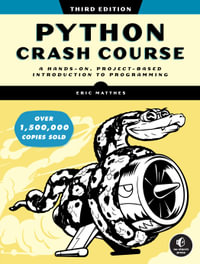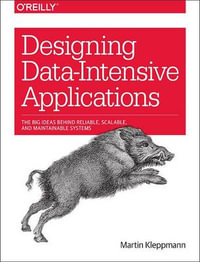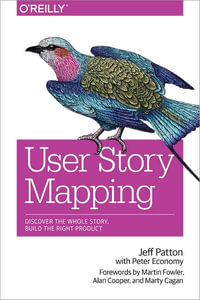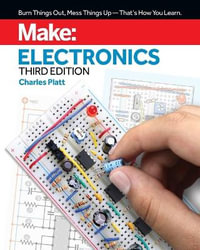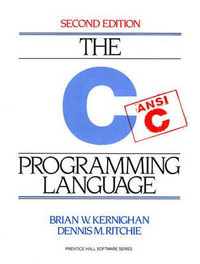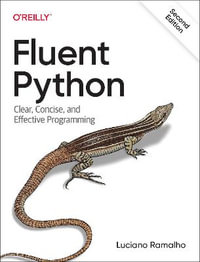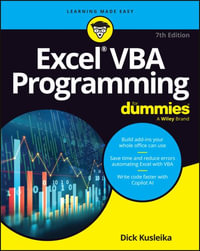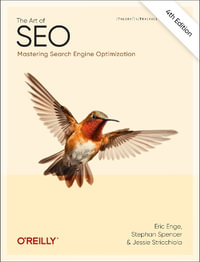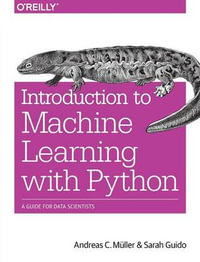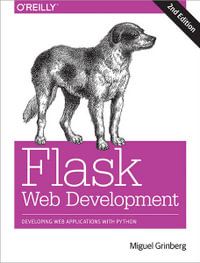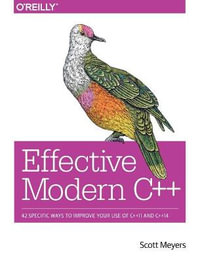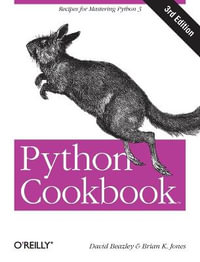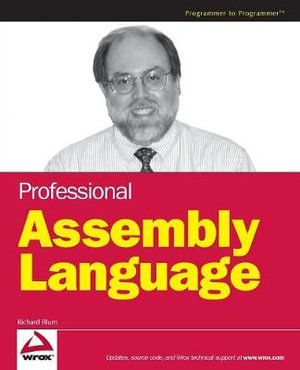
Instant online reading.
Don't wait for delivery!
Go digital and save!
At a Glance
576 Pages
23.5 x 19.0 x 3.0
Paperback
$102.50
or 4 interest-free payments of $25.63 with
orAims to ship in 10 to 15 business days
When will this arrive by?
Enter delivery postcode to estimate
Acknowledgments xi
Contents xiii
Introduction xxiii
Chapter 1: What Is Assembly Language? 1
Processor Instructions 1
Instruction code handling 2
Instruction code format 3
High-Level Languages 6
Types of high-level languages 7
High-level language features 9
Assembly Language 10
Opcode mnemonics 11
Defining data 12
Directives 14
Summary 15
Chapter 2: The IA-32 Platform 17
Core Parts of an IA-32 Processor 17
Control unit 19
Execution unit 24
Registers 25
Flags 29
Advanced IA-32 Features 32
The x87 floating-point unit 32
Multimedia extensions (MMX) 33
Streaming SIMD extensions (SSE) 33
Hyperthreading 34
The IA-32 Processor Family 34
Intel processors 35
Non-Intel processors 36
Summary 37
Chapter 3: The Tools of the Trade 39
The Development Tools 39
The Assembler 40
The Linker 42
The Debugger 43
The Compiler 44
The object code disassembler 44
The Profiler 44
The GNU Assembler 45
Installing the assembler 45
Using the assembler 47
A word about opcode syntax 49
The GNU Linker 50
The GNU Compiler 53
Downloading and installing gcc 53
Using gcc 54
The GNU Debugger Program 56
Downloading and installing gdb 56
Using gdb 57
The KDE Debugger 60
Downloading and installing kdbg 60
Using kdbg 60
The GNU Objdump Program 62
Using objdump 63
An objdump example 64
The GNU Profiler Program 65
Using the profiler 65
A profile example 68
A Complete Assembly Development System 69
The basics of Linux 69
Downloading and running MEPIS 70
Your new development system 71
Summary 72
Chapter 4: A Sample Assembly Language Program 73
The Parts of a Program 73
Defining sections 74
Defining the starting point 74
Creating a Simple Program 75
The CPUID instruction 76
The sample program 77
Building the executable 80
Running the executable 80
Assembling using a compiler 80
Debugging the Program 81
Using gdb 81
Using C Library Functions in Assembly 86
Using printf 87
Linking with C library functions 88
Summary 90
Chapter 5: Moving Data 91
Defining Data Elements 91
The data section 91
Defining static symbols 94
The bss section 95
Moving Data Elements 97
The MOV instruction formats 97
Moving immediate data to registers and memory 98
Moving data between registers 99
Moving data between memory and registers 99
Conditional Move Instructions 106
The CMOV instructions 107
Using CMOV instructions 109
Exchanging Data 110
The data exchange instructions 111
Using the data exchange instruction 116
The Stack 119
How the stack works 119
PUSHing and POPing data 120
PUSHing and POPing all the registers 123
Manually using the ESP and EBP registers 123
Optimizing Memory Access 123
Summary 124
Chapter 6: Controlling Execution Flow 127
The Instruction Pointer 127
Unconditional Branches 129
Jumps 129
Calls 132
Interrupts 135
Conditional Branches 136
Conditional jump instructions 136
The compare instruction 138
Examples of using the flag bits 140
Loops 144
The loop instructions 144
A loop example 145
Preventing LOOP catastrophes 145
Duplicating High-Level Conditional Branches 146
if statements 147
for loops 150
Optimizing Branch Instructions 153
Branch prediction 153
Optimizing tips 155
Summary 158
Chapter 7: Using Numbers 161
Numeric Data Types 161
Integers 162
Standard integer sizes 162
Unsigned integers 164
Signed integers 166
Using signed integers 168
Extending integers 169
Defining integers in GAS 172
SIMD Integers 173
MMX integers 173
Moving MMX integers 174
SSE integers 176
Moving SSE integers 177
Binary Coded Decimal 178
What is BCD? 178
FPU BCD values 179
Moving BCD values 180
Floating-Point Numbers 182
What are floating-point numbers? 182
Standard floating-point data types 184
IA-32 floating-point values 186
Defining floating-point values in GAS 187
Moving floating-point values 187
Using preset floating-point values 189
SSE floating-point data types 190
Moving SSE floating-point values 191
Conversions 196
Conversion instructions 196
A conversion example 198
Summary 199
Chapter 8: Basic Math Functions 201
Integer Arithmetic 201
Addition 201
Subtraction 210
Incrementing and decrementing 215
Multiplication 216
Division 221
Shift Instructions 223
Multiply by shifting 224
Dividing by shifting 225
Rotating bits 226
Decimal Arithmetic 227
Unpacked BCD arithmetic 227
Packed BCD arithmetic 229
Logical Operations 231
Boolean logic 231
Bit testing 232
Summary 233
Chapter 9: Advanced Math Functions 235
The FPU Environment 235
The FPU register stack 236
The FPU status, control, and tag registers 237
Using the FPU stack 242
Basic Floating-Point Math 245
Advanced Floating-Point Math 249
Floating-point functions 249
Partial remainders 252
Trigonometric functions 254
Logarithmic functions 257
Floating-Point Conditional Branches 259
The FCOM instruction family 260
The FCOMI instruction family 262
The FCMOV instruction family 263
Saving and Restoring the FPU State 265
Saving and restoring the FPU environment 265
Saving and restoring the FPU state 266
Waiting versus Nonwaiting Instructions 269
Optimizing Floating-Point Calculations 270
Summary 270
Chapter 10: Working with Strings 273
Moving Strings 273
The MOVS instruction 274
The REP prefix 278
Other REP instructions 283
Storing and Loading Strings 283
The LODS instruction 283
The STOS instruction 284
Building your own string functions 285
Comparing Strings 286
The CMPS instruction 286
Using REP with CMPS 288
String inequality 289
Scanning Strings 291
The SCAS instruction 292
Scanning for multiple characters 293
Finding a string length 295
Summary 296
Chapter 11: Using Functions 297
Defining Functions 297
Assembly Functions 299
Writing functions 299
Accessing functions 302
Function placement 304
Using registers 304
Using global data 304
Passing Data Values in C Style 306
Revisiting the stack 306
Passing function parameters on the stack 306
Function prologue and epilogue 308
Defining local function data 309
Cleaning out the stack 312
An example 312
Watching the stack in action 314
Using Separate Function Files 317
Creating a separate function file 317
Creating the executable file 318
Debugging separate function files 319
Using Command-Line Parameters 320
The anatomy of a program 320
Analyzing the stack 321
Viewing command-line parameters 323
Viewing environment variables 325
An example using command-line parameters 326
Summary 328
Chapter 12: Using Linux System Calls 329
The Linux Kernel 329
Parts of the kernel 330
Linux kernel version 336
System Calls 337
Finding system calls 337
Finding system call definitions 338
Common system calls 339
Using System Calls 341
The system call format 341
Advanced System Call Return Values 346
The sysinfo system call 346
Using the return structure 347
Viewing the results 348
Tracing System Calls 349
The strace program 349
Advanced strace parameters 350
Watching program system calls 351
Attaching to a running program 353
System Calls versus C Libraries 355
The C libraries 356
Tracing C functions 357
Comparing system calls and C libraries 358
Summary 359
Chapter 13: Using Inline Assembly 361
What Is Inline Assembly? 361
Basic Inline Assembly Code 365
The asm format 365
Using global C variables 367
Using the volatile modifier 369
Using an alternate keyword 369
Extended ASM 370
Extended ASM format 370
Specifying input and output values 370
Using registers 372
Using placeholders 373
Referencing placeholders 376
Alternative placeholders 377
Changed registers list 377
Using memory locations 379
Using floating-point values 380
Handling jumps 382
Using Inline Assembly Code 384
What are macros? 384
C macro functions 384
Creating inline assembly macro functions 386
Summary 387
Chapter 14: Calling Assembly Libraries 389
Creating Assembly Functions 389
Compiling the C and Assembly Programs 391
Compiling assembly source code files 392
Using assembly object code files 392
The executable file 393
Using Assembly Functions in C Programs 395
Using integer return values 396
Using string return values 397
Using floating-point return values 400
Using multiple input values 401
Using mixed data type input values 403
Using Assembly Functions in C++ Programs 407
Creating Static Libraries 408
What is a static library? 408
The ar command 409
Creating a static library file 410
Compiling with static libraries 412
Using Shared Libraries 412
What are shared libraries? 412
Creating a shared library 414
Compiling with a shared library 414
Running programs that use shared libraries 415
Debugging Assembly Functions 417
Debugging C programs 417
Debugging assembly functions 418
Summary 420
Chapter 15: Optimizing Routines 421
Optimized Compiler Code 421
Compiler optimization level 1 422
Compiler optimization level 2 423
Compiler optimization level 3 425
Creating Optimized Code 425
Generating the assembly language code 425
Viewing optimized code 429
Recompiling the optimized code 429
Optimization Tricks 430
Optimizing calculations 430
Optimizing variables 433
Optimizing loops 437
Optimizing conditional branches 442
Common subexpression elimination 447
Summary 450
Chapter 16: Using Files 453
The File-Handling Sequence 453
Opening and Closing Files 454
Access types 455
UNIX permissions 456
Open file code 458
Open error return codes 459
Closing files 460
Writing to Files 460
A simple write example 460
Changing file access modes 462
Handling file errors 462
Reading Files 463
A simple read example 464
A more complicated read example 465
Reading, Processing, and Writing Data 467
Memory-Mapped Files 470
What are memory-mapped files? 470
The mmap system call 471
mmap assembly language format 473
An mmap example 475
Summary 479
Chapter 17: Using Advanced IA-32 Features 481
A Brief Review of SIMD 481
MMX 482
SSE 483
SSE2 483
Detecting Supported SIMD Operations 483
Detecting support 484
SIMD feature program 485
Using MMX Instructions 487
Loading and retrieving packed integer values 487
Performing MMX operations 488
Using SSE Instructions 497
Moving data 498
Processing data 499
Using SSE2 Instructions 504
Moving data 505
Processing data 505
SSE3 Instructions 508
Summary 508
Index 511
ISBN: 9780764579011
ISBN-10: 0764579010
Series: Programmer to Programmer
Published: 1st February 2005
Format: Paperback
Language: English
Number of Pages: 576
Audience: General Adult
Publisher: John Wiley & Sons Inc (US)
Country of Publication: GB
Edition Number: 1
Dimensions (cm): 23.5 x 19.0 x 3.0
Weight (kg): 0.94
Shipping
| Standard Shipping | Express Shipping | |
|---|---|---|
| Metro postcodes: | $9.99 | $14.95 |
| Regional postcodes: | $9.99 | $14.95 |
| Rural postcodes: | $9.99 | $14.95 |
How to return your order
At Booktopia, we offer hassle-free returns in accordance with our returns policy. If you wish to return an item, please get in touch with Booktopia Customer Care.
Additional postage charges may be applicable.
Defective items
If there is a problem with any of the items received for your order then the Booktopia Customer Care team is ready to assist you.
For more info please visit our Help Centre.

